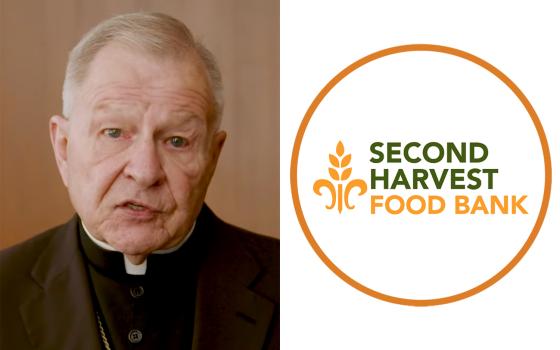
Approximately 500 religious treasurers attend at a conference hosted by the Vatican Congregation for Religious on Sunday at the Pontifical University of St. Anthony. (NCR Photo/Joshua J. McElwee)
The Vatican office responsible for the approximately 900,000 priests and brothers and sisters in religious orders around the world called on them this weekend to re-evaluate their holdings of wealth and to issue critiques of the global market capitalist economy, calling it unjust to the world's neediest.
Holding a conference near the Vatican for some 500 treasurers of the global orders Saturday and Sunday, the Vatican office looked back to the earliest teachings of the church, calling on the religious to reject accumulation of goods in order to follow Jesus, "the poor man who lives in solidarity with the poor."
Those were the words of Archbishop José Rodríguez Carballo, the secretary of the Vatican congregation, who in opening remarks also said, "Disciples must have nothing, not bread, not money in their bags."
Carballo continued, critiquing orders that have accumulated wealth over the years: "We always justify accumulation for the mission, but then that money doesn't arrive at the mission."
Accumulating such wealth, the archbishop said, "entails the danger of not being in the presence of God ... to lose the memory of God -- trust in him -- and forgetting about the poor."
Carballo's office, the Congregation for Institutes of Consecrated Life and Societies of Apostolic Life, organized the first-of-its-kind summit at the request of Pope Francis.
Over some 15 talks during the two days, speakers selected by the office focused both on practical questions facing religious orders around the world -- particularly how to cope with extra property and assets in an age of dwindling vocations to religious life -- and on wider issues, like how religious should respond to disparities in the global economic system.
A constant theme during the event, held at Rome's Franciscan-run Pontifical University of St. Anthony, was criticism of the capitalist system, which several speakers called a "structure of sin" that purposefully does not attend to the needs of the poorest.
Outlining the church's response to the global economic system over the past several hundred years, one presenter, Stefano Zamagni, said it was "an unforgivable mistake" that the church had not more openly critiqued the capitalist system.
Zamagni, a professor of economic politics at Italy's University of Bologna and a member of the Pontifical Academy of the Sciences, critiqued particularly the American model of capitalism, which he said allows people to exploit the world's resources to gather wealth and then only expects them to focus on charitable work once they are wealthy.
"A Christian just cannot accept this," Zamagni said. "It is not me saying this. It is the sacred Scriptures. We cannot accept this logic."
Quoting Popes Paul VI's and John Paul II's writings on "structures of sin," Zamagni told the religious that if they allow their money to be used according to societal norms for accumulating wealth, they are contradicting church teachings.
"If individually we behave in a good way but institutionally we do bad things, we are not good Christians," he said. "If I am good but the rules of the game are perverted, I will cause evil things."
In remarks read to attendees by congregation prefect Brazilian Cardinal João Braz de Aviz, Francis warned the religious against a "theoretical poverty," writing that they need a poverty that comes from "touching the flesh of the poor Christ: in the humble, the poor, the sick, the children."
Likewise, in his talk, Carballo cited the story in Luke's Gospel of how Jesus treated a rich man who asked to be his disciple. Jesus, according to the story, told the man he must first give up his wealth if he wished to follow Jesus.
"Those who do not renounce wealth cannot be disciples," Carballo said. "This relationship is very clear. The disciples are called to follow God. They are called to entrust everything with God and only with God."
Citing the Second Vatican Council document on the church in the modern world, Gaudium et Spes, Carballo said the religious must focus on administering their goods in a way that gives benefit "not only to the owners, but also to others."
Church teaching on that issue, the archbishop said, "must cease to be hot air and must be at the basis for the creation of a new society" that "fights to redeem people -- the sons and daughters of God -- against an indiscriminate use of temporal goods."
The weekend summit, given the theme "The management of the ecclesiastical goods of Institutes of Consecrated Life and Societies of Apostolic Life, for the service of humanity and for the mission of the Church," was hosted mainly in Italian with simultaneous translation into English, Spanish and French.
It follows pointed remarks from Francis in the fall, who asked leaders of religious orders to re-evaluate management of their assets, especially empty monasteries and convents that in recent years have frequently been turned over to nonreligious pursuits, such as hotels and restaurants.
Another speaker at the conference was Sr. Evelyne Franc, the superior general of the international order of the Daughters of Charity, based in France and founded under the charism of the 17th-century St. Vincent de Paul.
Hosting a roundtable Sunday on a "prophetic, communal economy with solidarity," Franc said her order revised its constitutions in 2003 to include a promise to "work to change the unjust structures that cause poverty."
Franc said orders face a "challenge of authenticity between our principles and what we do."
"We run the risk of leaving money our master and leaving the social doctrine of the church to one side when our interests and our congregation are in question," she said. "We need to be vigilant in our style of life so as to counter this culture."
Among others addressing the event was Indianapolis Archbishop Joseph Tobin, who spoke Saturday on how management of goods and assets by religious orders affects diocesan bishops.
Tobin, a member of the Redemptorist order who preceded Carballo as secretary of the Vatican congregation from 2010-2012, outlined particularly the process religious should follow when deciding to close a ministry they maintain in a diocese, such as a school or hospital.
Citing several examples where bishops and orders had come to disagreement over closing of a ministry, Tobin asked the religious to be in "constant communication" with their bishops over their needs.
However, the archbishop said, local bishops sometimes make "unjust interventions" into how orders decide to operate.
Also speaking during Sunday's roundtable was Kerry Robinson, the executive director of the U.S.-based National Leadership Roundtable on Church Management, which brings together lay experts and church leaders to promote best practices and management of church resources.
Robinson encouraged the religious to call on lay experts in various fields to help them in their use of financial assets, saying it brings about an "elegant and vital byproduct" of the evangelization of those experts.
"One is far more likely to become fully immersed and invested in the very life of the church if one is recognized for what she or he does best and is invited to blend that in service to the church," Robinson said.
Carballo, the congregation secretary, said Saturday the Vatican office is planning to use the discussions from the weekend conference as a starting point in the drafting of guidelines for religious orders in their use of money.
[Joshua J. McElwee is NCR national correspondent. His email address is jmcelwee@ncronline.org. Follow him on Twitter: @joshjmac.]



